Fernando, above
The hustlers of Mexico City’s Alameda Park barely get by in the best of times; during the COVID-19 pandemic, many of them are hungry, homeless and hopeless
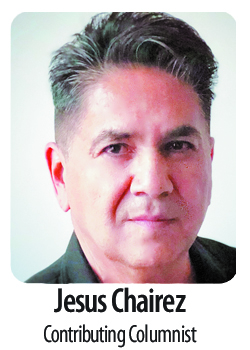 MÉXICO CITY — In the center of Mexico City sits the world renowned Alameda Central Park. Founded in 1592, it is the oldest public park in the Americas. Although not so popular with the locals, it draws many international tourists. And where there are tourists, there are hustlers.
MÉXICO CITY — In the center of Mexico City sits the world renowned Alameda Central Park. Founded in 1592, it is the oldest public park in the Americas. Although not so popular with the locals, it draws many international tourists. And where there are tourists, there are hustlers.
Alameda Park contains two museums along with numerous popular cafes, restaurants and cantinas — good places to sit outside and people watch. And with spring-like weather almost 365 days a year here, there are always lots of people around.
I often go to the only gay cantina at the park, La Rayuela. My first time sitting outside La Rayuela, I was most surprised at the number of young men walking by my table and saying hello, wanting to make conversation. I thought I was very special and pretty; then I figured it out. Those young men wanted me to “hire” them or least invite them for drinks.
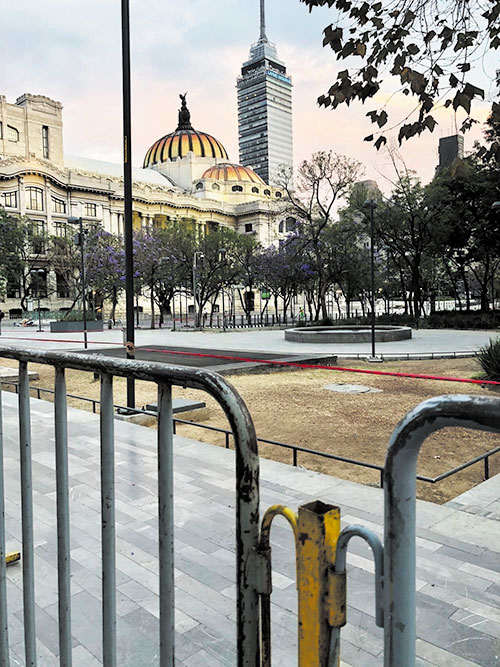
Alameda Park
I did invite some for cocktails; I always enjoy a good conversation over cold beers. And I wanted to know their stories, too.
After drinks, some of the hustlers wanted me to take them to my place and get intimate. I never took them up on those offers, figuring that would be too dangerous. When I said no to taking them to my place, they often told me, “I know where we get a room for $100 pesos” ($4 USD). I always said no to that, too, imagining a filthy room with dirty sheets and bedbugs. I wondered, if I went with them, would, make it out of the hotel alive or be found dead later by the cleaning lady?
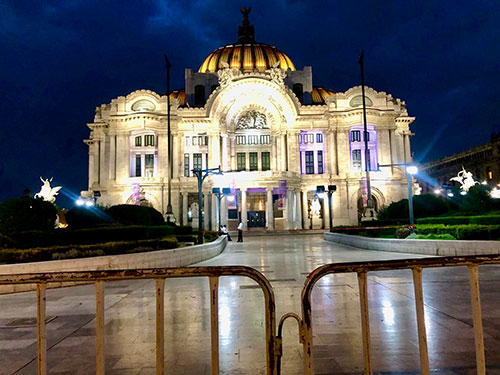
Alameda Park
Alameda Park attracts plenty of young male hustlers, and getting a client can be competitive. Walking around strutting like boastful roosters are twinks, muscular men in tight tank tops and some effeminate ones. There are plenty of “chacales” in in the park — young men with darker skin who are “tops” only and who can get a little rough at times.
The usual cost for a hustler is $250 peso ($10.50 USD). There are no high-end call boys in this part of the city and no Grinder hookups either. Hustlers will do anything you want – active, passive, fellatio. Some even offer the besos negro (the “black kiss”), which is what they call anal stimulation. I was amazed by such a low price.
But when you consider that the average daily income in Mexico is only $200 pesos ($8.50 USD), you realize that this is good, quick cash. If a hustler can get a couple of clients — or even just one client — a day, they are ahead of the average daily pay game.
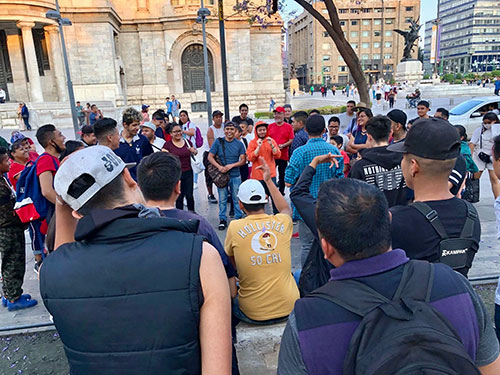
Crowd at Alameda Par
Then came COVID-19
Then the novel coronavirus or COVID-19 pandemic hit, and slowly things in Mexico City started to close. First to close were the cafes, restaurants, cantinas and gyms. Employers sent home non-essential workers. Then all hotels closed, and so did the parks. Alameda Park was sealed up with steel barricades, because people would not stop gathering there in crowds to dance to DJ music or be entertained by street performers.
All of Mexico went into stay at home mode, quarantined. Those who had jobs where they could work from home did just that. Many people lost their jobs and income, and many of them had no savings and no stimulus check for assistance.
In Mexico more than half of the population works at informal jobs; think street vendors and taco stands. And if they don’t work, they don’t eat.
That includes the male hustlers.
Alfredo
I wondered what happened to the hustlers, so I went looking for them at the park. I was particularly looking for those I had talked to in the past. At Alameda Park, all the hustlers except for maybe one or two were gone.
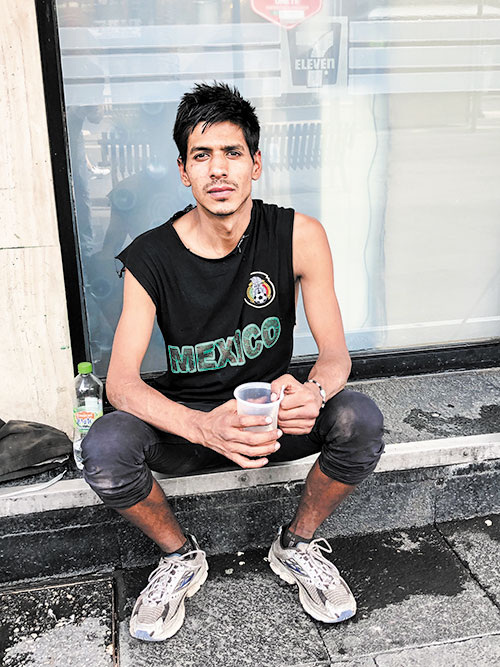
Alfredo
Their clients, usually older gentlemen, were also gone.
I did find Alfredo, a tall, thin, dark-skinned and handsome young man from the state of Guanajuato. Before the pandemic, no matter when I would go to the cafes or cantinas at the park, I would see Alfredo there. He was always smiling and always said hello. I would see him standing and talking with friends, or standing alone when he was working.
Although Alfredo lived on the streets — or stayed in a cheap hotel from time to time — he always looked well-groomed. But the day I found him after the epidemic came, he was outside of a convenience store, across the street from the park, eating ramen noodles. He looked worn out, beat and dirty, and his smiling, gregarious personality was gone.
He told me he was doing OK but that he was not able to get cleaned up because the hotels were all closed.
These days, he told me, if he does get a client the only place to go is the client’s home, and on those occasions, he gets to shower and sometimes even wash his clothes.
But those offers are few and far between.
Alfredo said he has been working the streets of Mexico City for three-and-half years now. He had been making around $700 pesos on the weekends, but now he is lucky to even have one client.
“Everyone is scared,” he told me. He said he is scared, too, but he has few options available. His usual fee had been $250 pesos. But now, Alfredo told me, he is so hard up for money he will take $100 peso (that’s $4.25 USD), but no less.
Most days, though, he makes nothing and only eats when someone gives him food.
Alfredo doesn’t have a cell phone, so he wasn’t able to build up a client base. He has no one to call for help or work. His only option is to keep a watchful eye out for clients at the park.
But the clients, for the most part, are quarantining at home.
I asked Alfredo where he was staying at night since all the hotels were closed. He explained he was sleeping at “El Caballito,” a 92-foot-tall yellow metal street sculpture near the park. He sleeps with three friends for protection.
Alfredo doesn’t think he can make it much longer in Mexico City and is considering going back home to his family in Guanajuato. After three years of hustling and living around, he said, it’s now time to give it up.
It broke my heart to see him so beat down, so I gave him a donation. When he started to thank me with a hug, I jumped back and asked him to keep his distance.
Fernando
I went looking for another familiar face to interview, but there were none. Then out of the blue, Fernando — a hustler I met last year in June — called me. Strange how that worked: I was looking for him, and he called. He said he wanted to talk to me because he wanted to ask me for a favor.
I knew what the favor probably was; he wanted money. But I wanted something too — an interview — so I agreed to meet him.
We met on the street near the park, and he made small talk for a while. I could see he was uncomfortable asking me for a favor, so I asked him: “How much do you need?”
He said needed $1,000 pesos ($40 USD) and that he would pay me back in June, when he thinks his day employer will ask him to go back to work.
Fernando looked well-groomed and clean when we met that day; obviously he wasn’t living on the streets. He told me he has his own apartment, a small place with two rooms outside the city center.
Fernando told me that he got into hustling a year and a half ago, strictly by accident. He said one day he went to Alameda Park to roller blade, and while he was resting on a bench, an older gentleman approached and asked him, “How much?” When Fernando asked the man what he meant, the man apologized, explaining he thought the younger man was a hustler. When the older man started to leave, though, Fernando called him back, and they went to a cheap hotel together.
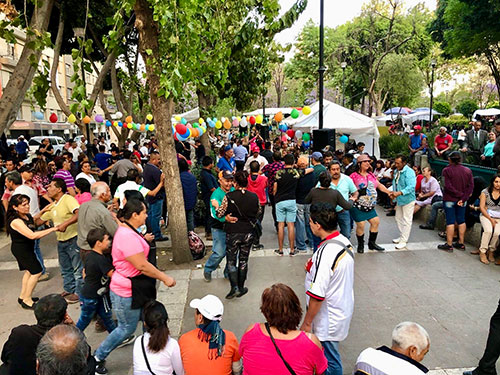
Crowd at Alameda Par
After that encounter, Fernando became a regular hustler, learning the trade by making friends with other hustlers. He did have a cell phone, which he used to build a client base. Clients could call him to set up a meeting, and when things were slow at the park, he could call them.
Fernando charges his clients $250 pesos ($10.50 USD) and can usually get two clients a day. But on Fridays and Saturdays, he often gets several clients, making up to $2,000 pesos ($81 USD) a day.
But now, he said, “all that money is now gone. People are afraid.”
Fernando said without his day job and with few clients, he has no income and doesn’t know what he will do.
He said he mostly stays at home watching television and no longer goes to Alameda Park.
He said he can probably get by the way for maybe another month.
After we talked, I decided to give him the “loan” he asked for. As he left, he promised, “I will pay you back.”
I don’t expect to be repaid, though. Because I know things aren’t likely to get better for him — or the others like him — any time soon.
Jesus Chairez, formerly of Dallas, now lives in Mexico City. He was the producer and host of North Texas first bilingual LGBTQ Latino radio show, Sin Fronteras on KNON 89.3 FM, and is a published author in the book, Queer Brown Voices. He can be reached at facebook.com/JesusChairez



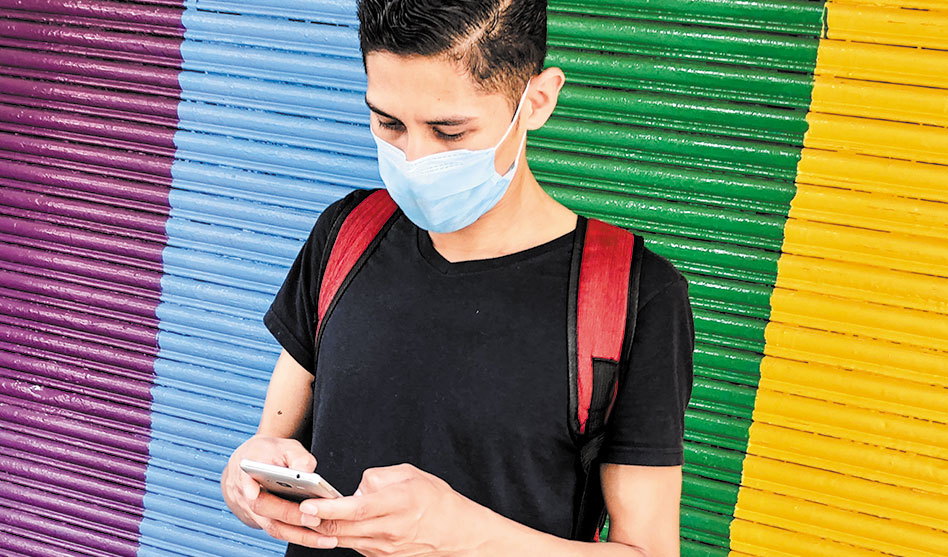








Sad, but a nice article. I imagine that it is likely a similar story in many cities around the world, across gender too. Thank you for calling our attention to this particular reality.